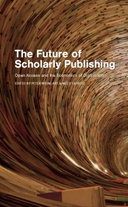Explore

The Future of Scholarly Publishing
Weingart, Peter and Taubert, Niels
2017
0 Ungluers have
Faved this Work
Login to Fave
The formal scientific communication system is currently undergoing significant change. This is due to four developments: the digitisation of formal science communication; the economisation of academic publishing as profit drives many academic publishers and other providers of information; an increase in the self-observation of science by means of publication, citation and utility-based indicators; and the medialisation of science as its observation by the mass media intensifies. Previously, these developments have only been dealt with individually in the literature and by science-policy actors.The Future of Scholarly Publishing documents the materials and results of an interdisciplinary working group commissioned by the Berlin-Brandenburg Academy of Sciences and Humanities (BBAW) to analyse the future of scholarly publishing and to make recommendations on how to respond to the challenges posed by these developments. As per the working group’s intention, the focus was mainly on the sciences and humanities in Germany. However, in the course of the work it became clear that the issues discussed by the group are equally relevant for academic publishing in other countries. As such, this book will contribute to the transfer of ideas and perspectives, and allow for mutual learning about the current and future state of scientific publishing in different settings.
This book is included in DOAB.
Why read this book? Have your say.
You must be logged in to comment.
Rights Information
Are you the author or publisher of this work? If so, you can claim it as yours by registering as an Unglue.it rights holder.Downloads
This work has been downloaded 266 times via unglue.it ebook links.
- 266 - pdf (CC BY) at africanminds.co.za.
Keywords
- Academic Publishing
- Copyright
- open access
- Peer review
- Research
- Scholarly publishing
- Science
- science communication
- Society & Social Sciences
- thema EDItEUR::J Society and Social Sciences
Links
DOI: 10.5281/zenodo.1003186Editions

